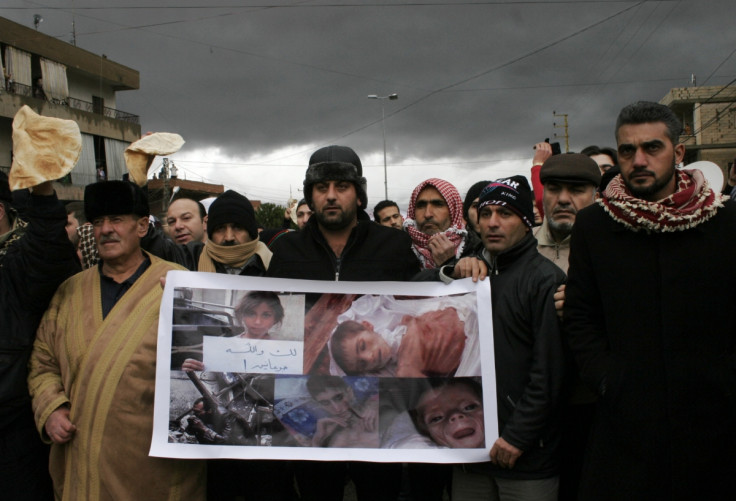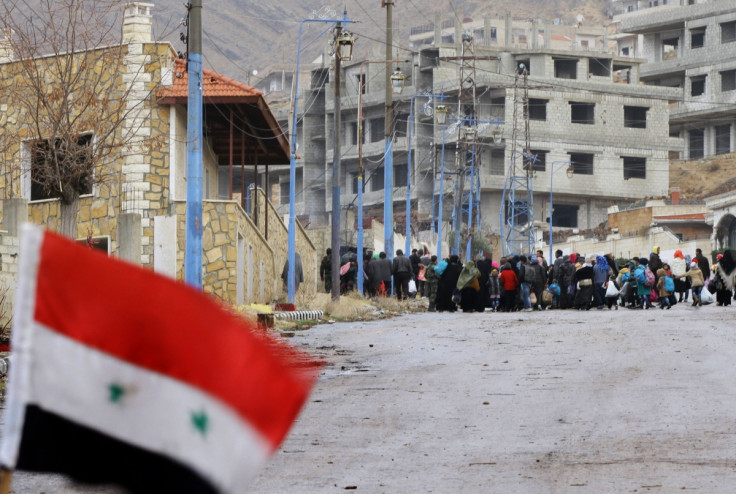Why does the West ignore Madaya, the Syrian town where Assad is starving people to death?

Nobody should die of starvation in the 21st century. In a world of relative abundance, this ought to be self-evident. If famines are not always man-made, then the human consequences of famine are invariably the result of calculated political decisions. There will always be localised droughts, crop failures and military conflicts; yet in most instances the rich world has the technology and the financial know-how to mop up the humanitarian fallout from these disasters – if it chooses to.
A great deal of meaning is contained in those four short words: if it chooses to. Often the West chooses not to act. Thus in the aftermath of whatever disaster it has dodged it seeks to expunge itself of guilt by grandly proclaiming 'never again'. Never again until the next time, of course.
Once again the West has chosen not to act, this time in Madaya, a small mountainous town of 42,000 people in Syria. People are starving and malnourished in Madaya because, along with 12 other cities and towns in Syria, it is under siege as part of the dictatorship of Bashar al Assad's 'kneel and starve' campaign, a method of collective punishment aimed at forcing rebellious towns to surrender to the government. Relief workers have reported 32 deaths from starvation in the past month. Though some aid has finally been allowed to get through, five of these deaths have taken place in the last week since it was received.
The Assad dictatorship has been waging a brutal war on the people of Syria for five years now. Ever since Assad's security forces first opened fire on teenagers protesting against government violence in early 2011, over 250,000 people have been killed, the vast majority victims of government violence. According to the Syrian Network for Human Rights (SNHR), at least 1,232 civilians were killed in Syria in December; 85% of those were killed by regime forces. Along with barrel bombs and poisonous gas, starvation is just another of Assad's weapons of war.

United Nations officials are certainly aware of the plight of hungry and malnourished Syrians in Madaya. The UN has, belatedly, described the siege as a war crime. Yet according to an internal memo leaked to Foreign Policy magazine, the UN has known about the crisis in Madaya since October 2015. However, it stayed quiet until now because, according to Syrian medical and rescue workers, its staff on the ground in Syria are "either too close to the [Assad] regime or too scared of having their visas revoked by the same powers that are besieging us".
Unfortunately, acquiescence in the Assad dictatorship's war on the people of Syria extends beyond the UN. In practical terms, reaching some sort of accommodation with Assad's dictatorship appears to have become de facto western policy vis-a-vis the Middle East. Once upon a time US President Barack Obama insisted that Assad had to go. Today Obama speaks of a political process in which "we can start looking at Mr Assad choosing not run" while prioritising warm relations with Assad's backers in Tehran. In Britain meanwhile, the House of Commons Foreign Affairs Select Committee has gone one further and called openly for co-operation with the Assad regime in the fight against Islamic State (Isis).
The Bashar al-Assads and Vladimir Putins of the world are attractive to a certain type of person because they talk in a familiar language. They have learned from the Bush administration of a decade ago that if you wage a 'war on terror' and portray yourself as engaged in a binary struggle with extremists you can get away with almost anything. Never mind that it is Assad who has done the most to fuel extremism and that it is Assad who benefits the most from the existence of extremists – without them he is just another dictator clinging desperately to power. Never mind that. For western politicians and diplomates Assad is increasingly someone they can do business with.
Fascism in 2016 is, after all, supposed to wear a beard and gesticulate wildly; it isn't supposed to come in a bespoke suit. Increasingly only Syrians see the revolver concealed behind the dictator's back; a weapon brandished against civilians in the past five years far more bloodily than anything unleashed by Isis (Daesh_.
Fallacious comparisons with the 1930s are partly to blame for the failure of the west to understand Syria. In Britain at least, politicians and commentators seem almost desperately to yearn for the certainties of that 'low, dishonest decade'. Writers want to imitate Orwell and politicians seek to ape Churchill. They want, above all, to be good anti-fascists. And thus, like Churchill sitting drunk at Stalin's dinner table, they cravenly seek accommodation with those ostensibly fighting 'fascism' (today embodied by Daesh). Never mind that in Syria in 2016 it is those posing as the most erstwhile 'anti-fascists' who look every bit as fascist as those they are fighting.
Yet accommodation with mass murder will almost invariably be the price western politicians are willing to pay to defeat Isis. President Obama may shed a tear on national television for the victims of American gun violence; yet Hezbollah, newly-minted thanks to Obama's nuclear deal, have been funnelling guns and bombs into Syria with which to murder Syrian children. In Britain, Tory MPs now talk openly about working with Assad to defeat Isis, while their friends in the media denounce Syrian refugees as potential rapists.
As for those 'anti-war protesters' who sent MPs pictures of dead Syrian children just six weeks ago, that vitriol dissipated like smoke in the wind when activists were faced with the victims of Russian and Iranian bombs.
'Never again' is the mantra du jour of politicians and activists whenever a humanitarian catastrophe strikes; yet each time they are used the words ring a little hollower. There is no foreseeable end to the war in Syria while Assad remains in power. And you can save the crocodile tears for Madaya because, to paraphrase Che Guevara, as long as Assad stays put, the future for Syria is comprised of 'two, three, many Madayas'.
© Copyright IBTimes 2025. All rights reserved.






















